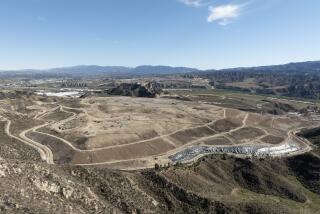Woo Says Agreement on Parkland Is Near : Fryman Canyon: The councilman and the head of the Santa Monica Mountains Conservancy say talks concerning the purchase of the 63-acre canyon are progressing. The sale would end developer’s plans to build homes there.
- Share via
An agreement was reported to be near last week that would end the controversy over development in Studio City’s Fryman Canyon by turning the canyon into parkland.
Los Angeles City Councilman Michael Woo and the head of the Santa Monica Mountains Conservancy, a state park agency, said long-stalled talks with a luxury home developer to buy the canyon from him for a park now are progressing favorably.
Public agencies, led by the conservancy, are very close to an agreement to buy the entire 63-acre canyon, Woo said.
Purchase of the tract, just north of Mulholland Drive and west of Laurel Canyon Boulevard, would end the developer’s plan to build houses there, which is intensely opposed by neighbors and environmentalists.
In a separate development, the state attorney general’s office warned that it may sue the city for failing to secure half the canyon for park use four years ago. In a letter to the Los Angeles City Council received Wednesday, the attorney general’s office warned that the state is considering a lawsuit against the city to secure 31 acres of the canyon for the conservancy.
The conservancy had been promised that the developer would donate the land to the state in return for city permits, but the city issued the permits even though the donation was never made, the letter said.
Sales negotiations between the conservancy and developer Fred Sahadi have long been stalled over price.
“The developer’s come down in price in recent days, but he’s still not met our appraisal price,” conservancy President Carole Stevens said.
The conservancy’s state appraiser has said the property is worth $8.7 million. But Sahadi had the land appraised at $13.7 million.
According to a source with knowledge of the negotiations, the parties are now talking about a price tag of about $12 million, which would make the parcel among the most expensive per acre of any purchased by the conservancy.
A spokeswoman for Woo said the councilman is exploring the use of city park funds to help the conservancy pay for the site. The conservancy cannot pay more than the state-appraised value.
News of the movement in negotiations emerged after Woo persuaded the council Wednesday to postpone until July 25 its consideration of a plan to declare part of Fryman Canyon a cultural-historic landmark.
“The threat of making the site a landmark has succeeded in bringing the negotiations to this point,” Woo said in an interview. “It’s created the right frame of mind on the developer’s part to talk,” but action should be delayed while sales negotiations continue, he said.
Two weeks ago, the council took up the question of declaring the land a cultural historic landmark, which would prevent development of the property for up to a year.
It also ordered city Planning Department officials to investigate how the department granted final approval to Sahadi’s project in 1986 without first requiring him to deed 31 acres of the property to the conservancy. The conservancy maintains that the developer was required to donate the land as a condition for obtaining city permits.
The 31 acres are important because Sahadi’s plans call for construction of a temporary haul road across this land to ease the building of 28 luxury houses on the other 32 acres. Without the haul road, it would be difficult or impossible for Sahadi to develop his property.
Sahadi’s attorneys have complained that state agencies have been collaborating to make it more difficult for Sahadi to develop the land in order to force him to sell to the conservancy at a lower price. City and state officials deny this.
In its six-page letter, the state attorney general’s office wrote that the “manner in which the haul road was approved was fundamentally flawed,” leaving “the approval of the haul road’s location vulnerable to legal challenge.”
Sahadi refused to discuss the negotiations with the conservancy. He called the attorney general’s letter an exercise in “sword rattling.”
“This has been a game of intimidation from day one, and this is no different,” he said, denying that he wrongly secured his approvals.
In another development, Stevens announced that the conservancy plans to hold a public meeting July 23 on the possibility of buying Fryman Canyon, at which the developer has been asked to offer his final price.
“I’ve dragged the staff and our advisory agency and the public through this long enough--now, let’s have hearing and get this over with,” Stevens said. “In my head, the 23rd is a deadline.”
The city Cultural Heritage Commission put Sahadi’s grading plans on hold in March so it could determine if Fryman Canyon merited cultural-historic landmark status.
The commission finally recommended that 31 acres of the canyon--on which Sahadi had no plans to build houses anyway--be declared a landmark, citing the unique natural features of the area, including stands of oak and walnut trees and a stream.
It was that recommendation that was before the council Wednesday and postponed until July 25.
More to Read
Sign up for Essential California
The most important California stories and recommendations in your inbox every morning.
You may occasionally receive promotional content from the Los Angeles Times.










